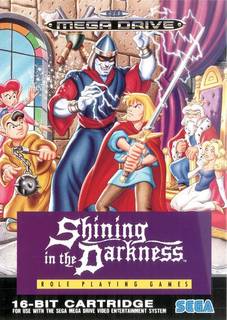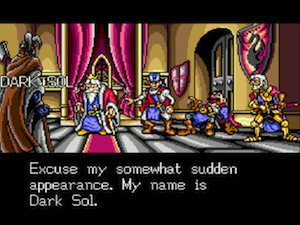
When Shining in the Darkness arrived on these shores, it certainly looked good. Though my favourite magazine gave it short shrift, it was well received elsewhere. The screenshots were beguiling with some beautiful-looking visuals and, you would assume, quite a hefty adventure packed into the cartridge. Alas, I didn't partake because of the price tag. Ho hum. And now, 25 years later? To be honest, I'm glad my much younger self saved his money.
Shining in the Darkness is an important game because it kicked off the Shining franchise of Japanese RPGs for Sega, but that doesn't excuse it for what is and was at the time quite a shallow role playing experience. Don't get me wrong, the presentation and graphics are totally superb. The art style is consistently excellent and imaginative. There is some humour hidden here too and it doesn't take itself terribly seriously. The story is standard meh - rescue the princess and your dad who've been whisked away into a nearby dungeon, and slay the evil Dark Sol while you're at it. But it's the game. The game.

Then what's the problem? Unfortunately, it's the grinding. The first encounter will probably knock off half your hit points and drop you between three experience points and three gold pieces. That means an awful lot of running back and forth to the village tavern for healing until you're tough enough. And that, I'm afraid, is the game. The entire game. Even boss monsters work on the same principle. Yes, there are elements of this in nearly all turn-based JRPGs, but it's present here in extremis. Other examples of the genre have the good sense to alternate environments or character perspectives, but here it's just the replacement of one dungeon wall texture by another. You go in the dungeon, fetch something, come out the dungeon. In the dungeon, out the dungeon. New monsters are occasionally interesting, but the promise of a bit more dialogue at the tavern or in audience with his majesty is not enough to sustain 40 or so hours worth of interest.
Perhaps as a teenager with nothing better to do I would have persevered, but definitely not now. Do bear that in mind should you fancy giving this game a whirl.
Nevertheless, it does raise interesting issues from the standpoint of social theory and video games. A number of papers in the edited collection, Dungeons, Dragons, and Denizens: The Digital Role-Playing Game link the character attribute/levelling system to neoliberal subjectivity. It's easy to see why. In all RPGs, characters are acquisitive. Progress in Shining in the Darkness or something more up to date like Dragon Age III is contingent upon gaining experience and finding/buying better kit so you stand more of a chance next time you go out into the wild. The analogy with the self-expansion of capital is obvious. Enemies aren't obstacles, they are resources (albeit hazardous ones) that are utterly necessary for you to transform into the stuff that makes you more powerful.

For Western and Japanese cultures now habituated to and exhorted to "do" entrepreneurship, it's small wonder that most people approaching Shining in the Darkness for the first time will find the game a complete chore. Engaging in never ending battles as you (very) slowly accumulate XP and money is too much like work because it's pretty much exactly the same as work for the vast majority of people. It's dull, it's demanding, it's repetitive, it's the trudge of having to accumulate to survive rather than thrive. At least for most of the game. In so doing, its plodding qualities stand much closer to the lived realities of the neoliberal workplace than the neoliberal designs for life disseminated by our institutions, discourses, and cultural artefacts. And in so doing, it suggests that a bit more care should be taken if folks interested in the sociological investigation and interpretation of video games are keen to draw analogies between digital game subjectivity and that abroad in real life.
No comments:
Post a Comment